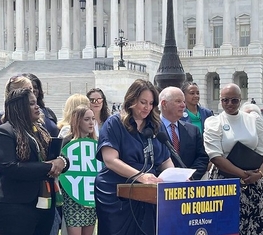Ashe v. Hargett
Case Summary
LWV of Tennessee and two individual Tennessee voters, one of whom was a Republican and the other a Democrat, filed a federal lawsuit asserting Tennessee’s requirement for voters to be “bona fide members” or “declare allegiance” to the party whose primary they chose to vote in violated the Fourteenth Amendment’s Due Process clause for vagueness and the First Amendment’s Free Speech clause for overbreadth.
The League of Women Voters of Tennessee (LWV of Tennessee) and two individual voters, Victor Ashe and Phil Lawson, filed a federal lawsuit in the United States District Court for the Middle District of Tennessee asserting two Tennessee laws regulating primary elections were unconstitutionally vague under the Fourteenth Amendment and overbroad in violation of the First Amendment.
Tennessee conducts its primary elections by allowing voters to choose which party’s primary to vote in. Voters do not explicitly register with a party in Tennessee. In other words, voters are not listed anywhere as “registered Democrats” or registered Republicans.” Plaintiff Victor Ashe historically voted in Republican primaries and was the party’s nominee against then-Senator Al Gore Jr. in the 1984 election. Plaintiff Phil Lawson is a prominent donor to the Tennessee Democratic Party but has voted for both Republican and Democratic candidates in the past. The League of Women Voters of Tennessee does not inquire as to the party affiliation of members, but members have self-identified as Democrats, Republicans, and independent voters. The League also provides education to members and the public about how to navigate the election process.
Upon arriving at a polling place, voters inform election workers which party primary they intend to cast a vote in. Voters may only vote once during a primary election, and their choice of ballot is recorded at the polling place and preserved as public record. Some Tennesseans vote in different parties’ primaries depending upon the position up for election. For example, a voter may vote in the Republican primary for gubernatorial elections and the Democratic primary for congressional elections.
Section 2-7-115(b) of the Tennessee Code prescribes the following requirements (“Section 115(b)”):
"(b) A registered voter is entitled to vote in a primary election for offices for which the voter is qualified to vote at the polling place where the voter is registered if:
(1) The voter is a bona fide member of and affiliated with the political party in whose primary the voter seeks to vote; or
(2) At the time the voter seeks to vote, the voter declares allegiance to the political party in whose primary the voter seeks to vote and states that the voter intends to affiliate with that party."
However, Tennessee has no prescribed procedure or method to formally declare oneself a bona fide member of a party or to declare allegiance to a political party.
In addition to Section 115(b), the Tennessee legislature also added new polling place regulations codified in Sections 2-7-115(c) of the Tennessee code (“Section 115(c)”). Section 115(c) requires the following signs be placed in polling places:
“It’s the law! Please read… It is a violation of Tennessee Code Annotated, Section 2-7-115(b), and punishable as a crime under Tennessee Code Annotated, Section 2-19-102 or Section 2-19-207, if a person votes in a political party’s primary without being a bona fide member of or affiliated with that political party, or to declare allegiance to that party without the intent to affiliate with that party."
No mention is made of voters voting absentee in primary elections.
Violators may be punished with fines and prosecuted for committing a Class C misdemeanor.
LWV of Tennessee and its co-plaintiffs asserted the lack of clarity in the definition of “bona fide member” or the process of “declaring allegiance” violated the Due Process Clause of the Fourteenth Amendment by making it impossible for ordinary citizens to determine what degree of allegiance or membership would allow them to avoid prosecution. The plaintiffs also argued Sections 115(b) and Section 115(c) violated the First Amendment, by chilling political speech through the notice posted at polling places and vague, unclear wording on declaring party membership and allegiance. The League will be unable to advise members or the public how to comply with the law while this lack of clarity exists.
LWV of Tennessee is represented in this matter by the Protect Democracy Project and Sidley Austin LLP. Plaintiffs Ashe and Lawson are represented by Sherrard Roe Voigt & Harbison, PLC and Baker, Donelson, Bearman, Caldwell & Berkowitz, PC.
LWV Timeline
LWV of Tennessee files lawsuit
LWV of Tennessee and individual Tennessee voters file a federal lawsuit, asserting Tennessee’s requirement that voters “declare allegiance” to a party or be “bona fide party members” to vote in parties’ primary elections, or face criminal penalties, violates the First and Fourteenth Amendments.
Plaintiffs file motion for preliminary injunction
Plaintiffs move for a preliminary injunction, asking the court to issue an order blocking the requirements of Section 115(b) and Section 115(c)from taking effect statewide.





